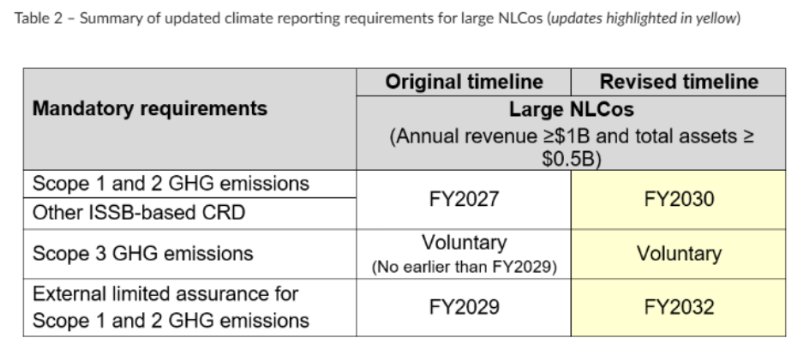Change is coming for listed companies in Singapore—starting in Fiscal Year 2025 (FY2025), the Singapore Exchange Regulation (SGX RegCo) will soon require all listed companies to report climate-related information in alignment with the International Financial Reporting Standards (IFRS). But don’t worry, we’re here to help you understand what’s happening and how to prepare.
The Lowdown on the New Climate Rules
Starting in FY2025, businesses must disclose their Scope 1 and 2 greenhouse gas emissions - these are the emissions tied to their direct operations and energy use. Larger companies will also be required to disclose Scope 3 emissions by FY2026 – which cover indirect emissions from their supply chains. The goal is to increase the transparency of sustainability efforts, aligning Singapore companies with international climate reporting practices.
The good news? The transition is being phased to give businesses, especially smaller ones, enough time to adapt to these requirements. In FY2025, companies must include climate-related information in their reports based on IFRS ISSB (International Sustainability Standards Board) standards, while other components of sustainability reports can be explained or complied with at a later stage.
The full set of mandatory requirements for sustainability reports will come into effect by FY2026, with companies expected to adhere to strict deadlines for publishing their reports.

The approach for listed companies, which takes immediate effect, is a three-tier structure to phase reporting obligations based on market capitalisation:
- Straits Times Index (STI) constituents;
- Non-STI constituent listed companies with a market capitalisation of $1 billion and above; and
- Non-STI constituent listed companies with a market capitalisation of less than $1 billion.
Scope 1 and 2 emissions reporting will remain mandatory for all listed companies from FY2025, and Scope 3 will remain mandatory for STI constituent[2] listed companies from FY2026. For other non-STI constituent listed companies, Scope 3 reporting will be voluntary until further notice.
- Other ISSB-based CRD (beyond Scope 1, 2 and 3)[3] will remain mandatory for STI constituent listed companies from FY2025.
- Non-STI constituent listed companies with a market capitalisation of $1 billion+ will be required to report other ISSB-based CRD from FY2028[4].
- Non-STI constituent listed companies with a market capitalisation of < $1 billion will follow from FY2030.
External limited assurance for Scope 1 and 2 emissions is deferred to FY2029 for all listed companies.
Updates for Large NLCos
As Large NLCos will be starting their climate reporting journey later than listed companies, they will now have more time to build up their climate reporting capabilities. The approach for large NLCos is updated accordingly:
- ISSB-based CRD (including Scope 1 and 2 emissions) are deferred to FY2030.
- Scope 3 emissions reporting remains voluntary until further notice.
- External limited assurance for Scope 1 and 2 GHG emissions is deferred to FY2032.

Tackling Scope 3
For Scope 3 emissions, which are often harder to measure due to their broad scope (covering indirect emissions from the value chain), companies will have additional time to prepare. SGX RegCo will monitor how well businesses are doing in preparing for these disclosures before setting firm deadlines for Scope 3 reporting. Scope 3 emissions will be required for large companies from FY2026, with small listed companies receiving more notice before they must comply.
The Implications of This on Your Business
These new climate-reporting requirements from SGX carry several important implications for businesses:
- Transparency is key: First, companies must be diligent in disclosing their environmental impact, which improves transparency for investors focused on sustainability. Larger firms will need to report on Scope 3 emissions by FY2026. Operational challenges are to be expected as these companies must enhance their infrastructure and data collection capabilities.
- Phased approach based on company size: Smaller companies may face difficulties due to resource constraints but SGX’s phased approach is designed to provide time and support to the SMEs seeing climate reporting on the horizon.
- Investment in compliance systems: Companies, regardless of size, will need to invest in compliance systems, potentially increasing initial operating costs. However, platforms like Zevero not only help avoid penalties for non-compliance but also unlock new business opportunities by actively managing carbon emissions and climate impact.
How Zevero can Help
This may sound overwhelming, but that’s where Zevero steps in. Our carbon management platform is designed to help companies measure, reduce and report their emissions across Scope 1, 2 and 3 emissions so you can meet SGX’s new climate-related reporting requirements and ensure you comply with the ISSB-aligned standards.
Zevero helps you accurately identify emission hotspots and simplifies the complex process of Scope 3 reporting which is a common challenge for many businesses. We offer more than just compliance - we provide the tools to develop decarbonisation strategies that make sense for your business.
Zevero enables companies to enhance their sustainability reporting and align with global standards, helping them mitigate regulatory risks and appeal to climate-conscious stakeholders and investors.
Key Takeaways
SGX’s new climate reporting mandates are on the horizon, but with Zevero by your side, you’ll be ready to meet them head-on. Whether you’re a small business preparing for the future or a large company navigating complex supply chains, Zevero can help you stay compliant, sustainable, and competitive.


